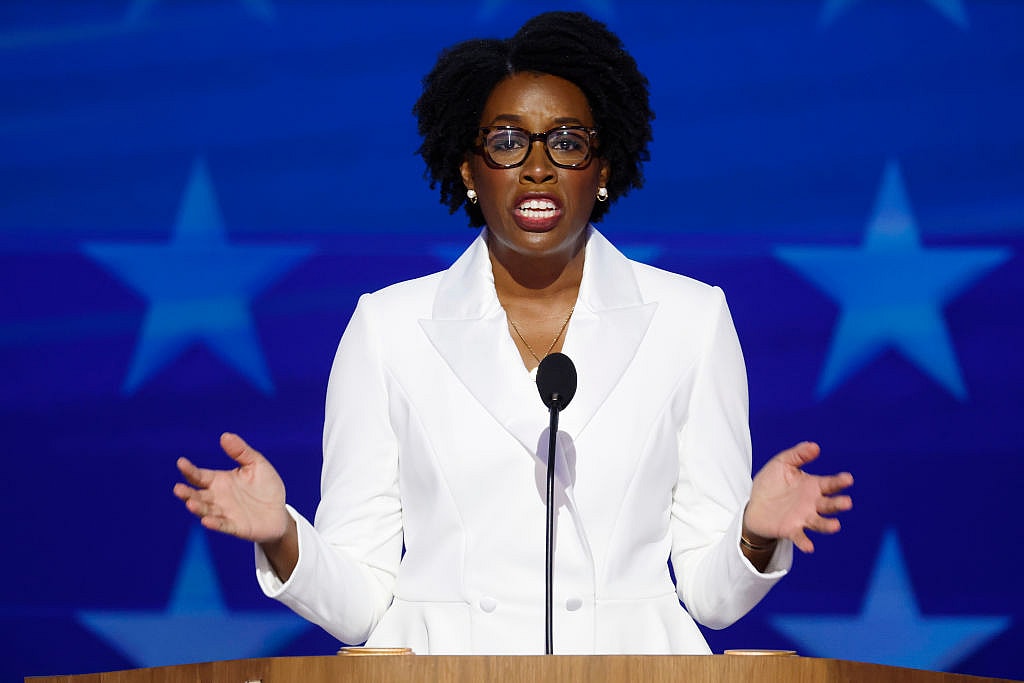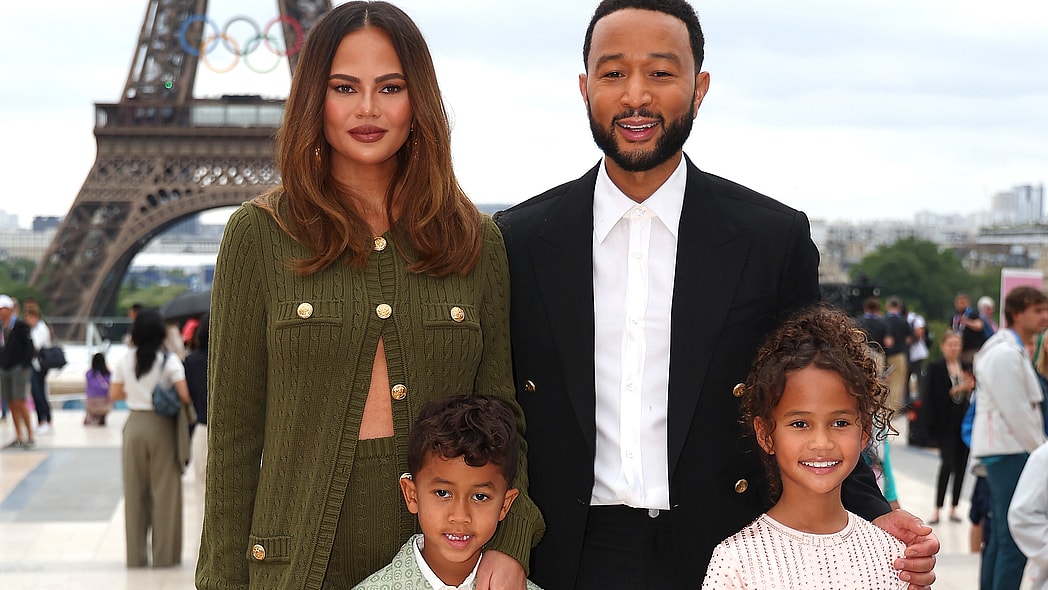For Black women delegates who cast their ballots for Vice President Kamala Harris at this year’s Democratic National Convention, her historic presidential nomination hits differently.
In less than 10 years, the party has nominated its second female presidential nominee and only its second Black candidate in less than 20 years. And as a Black and South Asian woman, Harris’ nomination is historic for multiple reasons.
Black women delegates at the DNC in Chicago who spoke with theGrio expressed their jubilation about being on the cusp of sending a woman — particularly a Black woman — to the Oval Office in less than 75 days on Nov. 5.
“It’s something that throughout these last few weeks, I’ve just been quite emotional thinking about this opportunity to do something that I’m not sure I ever thought I would be able to do in my lifetime,” said Illinois Lt. Gov. Juliana Stratton, a state delegate who is also a history maker as Illinois’ first Black female lieutenant governor.
“When I hear that a Black woman would be leading the free world, I have to pause for a moment because it’s not something we’ve heard before,” Stratton told theGrio.
Stratton said this moment reminds her of another history-making presidential candidate: former U.S. Congresswoman Shirley Chisholm.
Reflecting on Chisholm’s famous quote, “If they don’t give you a seat at the table, bring a folding chair,” Lt. Gov. Stratton said, “I think that this moment is an example of not just bringing a folding chair, but how Black women are also building our own tables.”
U.S. Rep. Lauren Underwood, an Illinois delegate, said she believes Chisholm would have been “proud” to see Harris achieve this political feat on behalf of women, particularly Black women.

“She’s able to speak to the Black experiences and the unique challenges of Black women, as leaders, and while also being really effective in driving change,” Underwood told theGrio.
“Congressman Chisholm has been such an inspiration to all of us, and there’s been so many threads in their leadership experience and approach,” she added.
Following record fundraising and support since Harris announced her presidential campaign last month, many have compared the enthusiasm about Harris’ candidacy to that of Barack Obama, who was elected America’s first Black president in 2008.
Stratton remembers being at Grant Park in Chicago at the time of Obama’s election.
“Everyone was laughing and smiling and crying and just soaking in the moment of what it meant to know that that barrier had been broken,” she recalled. “It was just one of those moments that you’re not sure could ever be recreated.”
Sixteen years later, Stratton said that Harris and her vice presidential running mate, Minnesota Gov. Tim Walz, are enjoying “incredibly high” momentum.
“Look at these rallies that we are seeing … there are people standing outside trying to get in. They’re filling up,” she noted. “There’s standing room only, people outside who can’t get in, including in states that honestly are battleground states or states where people aren’t expecting that type of enthusiasm for Democrats.”
Nervahna Crew, a Harris-Walz delegate from North Carolina, recalled working as a volunteer field organizer for Obama’s first presidential campaign. She also attended the 2008 DNC convention when Obama accepted the party’s nomination.

While Obama’s historic election was meaningful as a young Black American, Crew said Harris’ nomination “hit me a little different this time.”
For one, unlike in 2008, when she sat in the “nosebleed section, this year, as a delegate, she is able to be on the floor to witness “this pivotal moment in history.”
“Sometimes the stars just align,” said Alisha Bell, a delegate from Michigan and chair of the Wayne County Commission.
“The energy that I feel is the same energy that we had for Barack Obama,” she said. “I think a lot of women of color, and just women period, are just really geared up and excited about her potential win.”
Both Crew and Bell believe voters in their home states, North Carolina and Michigan – also key battleground states – will ultimately hand their electoral votes to Harris in November.
Black women delegates are particularly excited to see Harris finally shatter the glass ceiling that has contained women in politics since America’s founding nearly 250 years ago. The United States was on the precipice of electing its first woman president in 2016; however, Hillary Clinton’s candidacy was spoiled by an upset victory by Donald Trump, the Republican nominee seeking the presidency for a third time.
“We learned from the experience of Secretary Clinton that we can’t get so focused on the history-making, barrier-breaking aspects of an exciting candidacy and nomination,” said Congresswoman Underwood. “We have to do some really important work to mobilize voters and ensure that they have a plan to vote in this election.”
Lt. Gov. Stratton said the almost successful yet historic campaign of Clinton preceded a Republican movement aimed at freedoms held dear to women and many other vulnerable communities.

“We sort of touched that glass ceiling, and right after that … the GOP’s response to that was that they would start destroying every right that got us there in the first place,” she said. “Now we have another chance, really, to shatter what I consider to be sort of that ultimate glass ceiling.”
Crew, who was also a Hillary Clinton delegate in 2016, recalled volunteering for the Clinton campaign so hard that she developed a ganglion cyst on her foot.
“When I think back to 2016 and the hard work that we put in, especially in North Carolina, it makes me want to work even harder this cycle to make sure that we don’t miss the mark,” she told theGrio.
If Harris is successful in November, delegates tell theGrio that they are hopeful that she will prioritize policies that most impact Black women and their families, including protecting reproductive health like abortion care access.
Underwood especially expects to see a focus on maternal health, considering Black women are three times more likely to die from pregnancy.
“It’s essential because there’s a real urgency around the crisis. It’s getting worse. The maternal mortality rate has increased 89% since the pandemic,” said the congresswoman, who introduced comprehensive maternal health legislation called the Momnibus Act with Harris when she served in the Senate.
As vice president, Harris has used her office to highlight the racial disparities in maternal health and successfully pressured states to expand Medicaid services for postpartum care from two months to 12 months.

If Harris, along with Congress, is able to pass the Momnibus Act, women and pregnant people will “be able to survive what should be a joyous time,” said Underwood.
She added, “We will no longer see moms dying in the United States due to preventable maternal death.”
Overall, the delegates say better outcomes will inevitably result from a Black woman leading the free world, both domestically and globally.
“Unfortunately, the United States is one of few developed countries who have not had a woman president. Being a woman that does bring a different dynamic to the table,” said Bell, the Michigan delegate.
Bell said that despite the history of racism and misogyny in the United States, it’s important that voters “dispel” any notion that she can’t win though she is admittedly “cautiously optimistic.”
“We know that there’s work to be done. We definitely cannot take this for granted at all,” she said. Bell continued, “We still have to go to our barbershops and beauty salons and just everyday people to help them understand and get them excited.”
Underwood said that with Donald Trump on the ballot, voters have a “real choice in this election.”
“Do you want a future that’s chaotic? An extremist who wants to control every facet of our society, as outlined through Trump’s Project 2025?” she asked of voters. “Or do you want a capable, talented, experienced leader, Kamala Harris, who is leading with joy and is welcoming the voices and experiences of all Americans into this campaign?”










